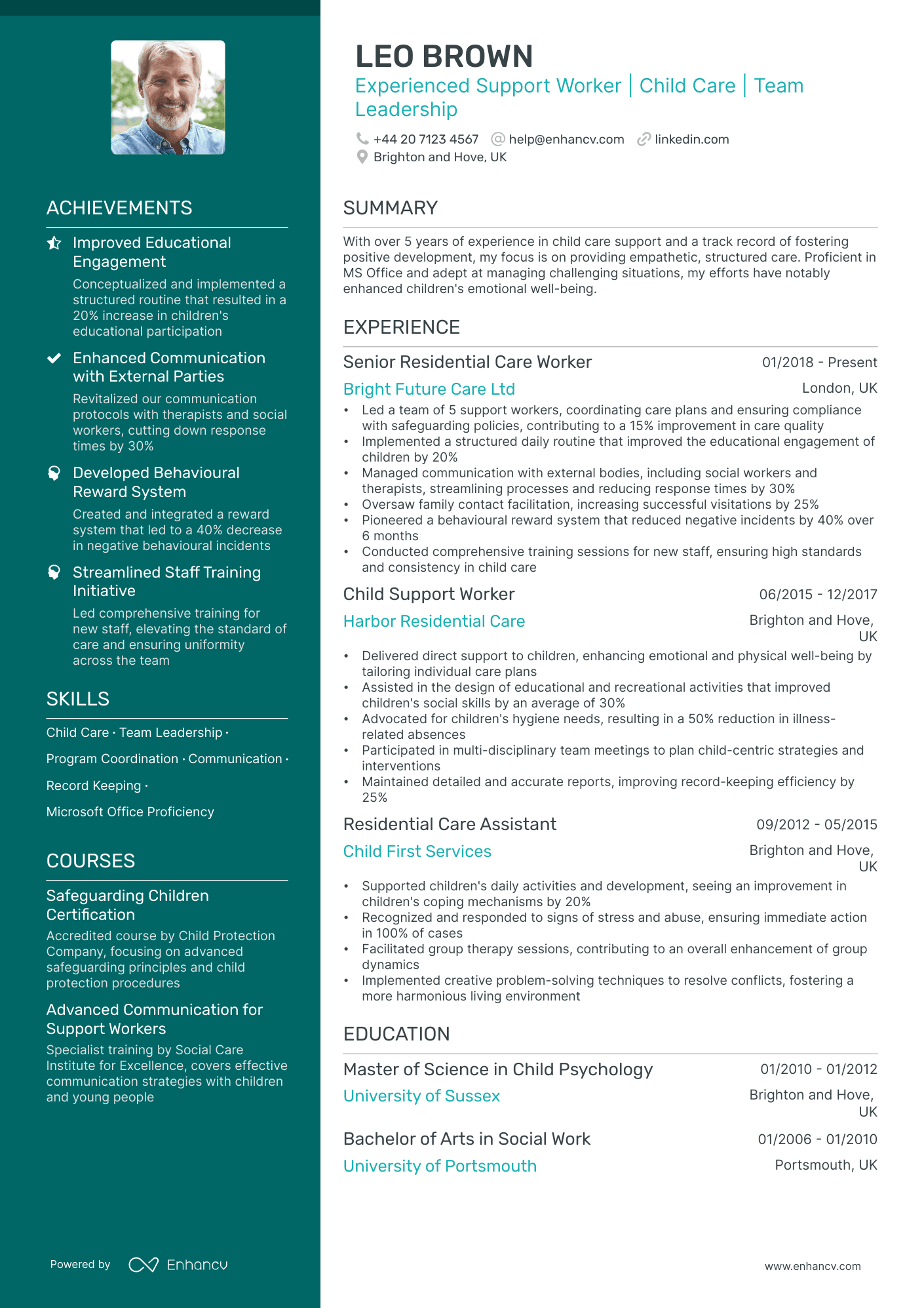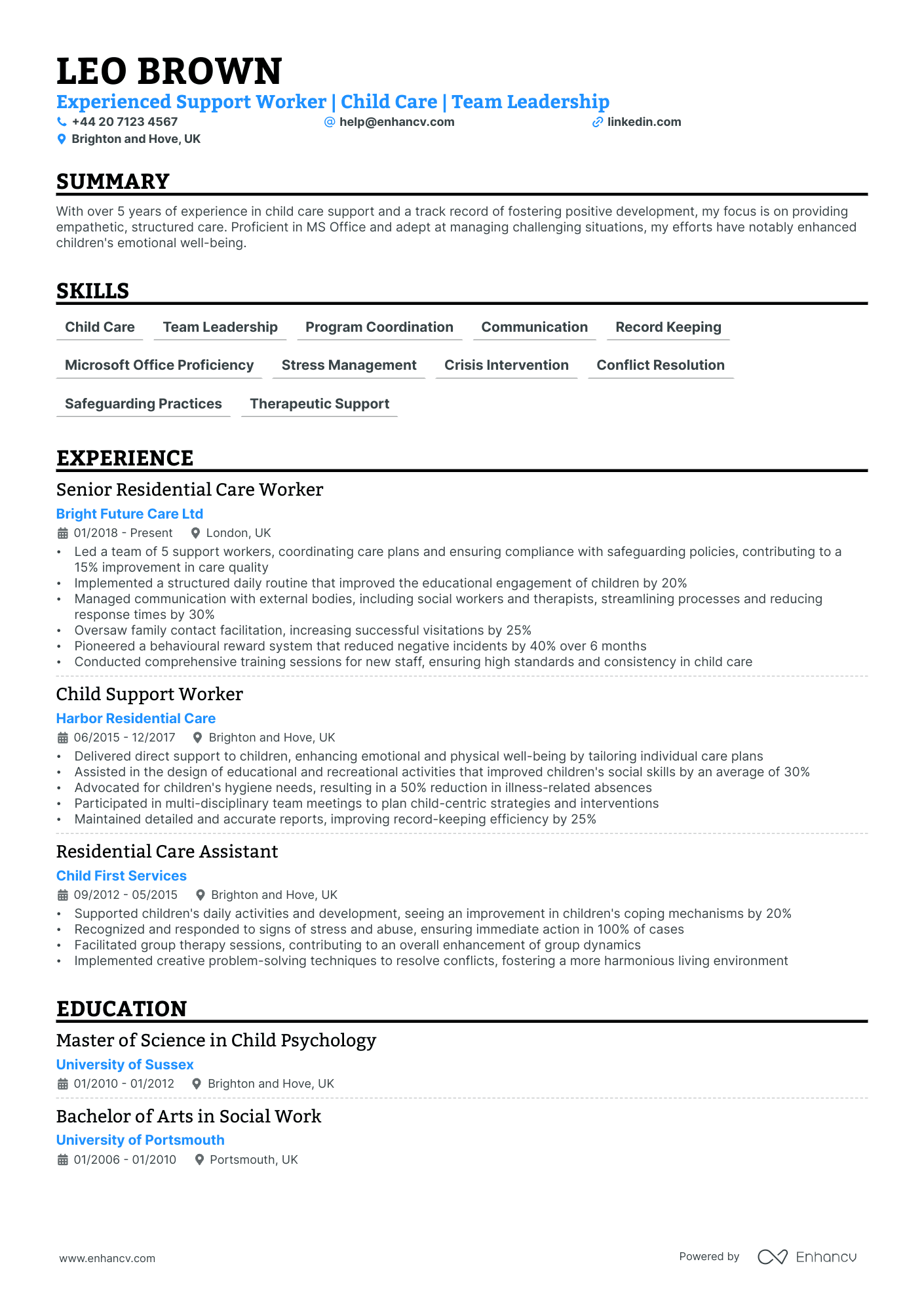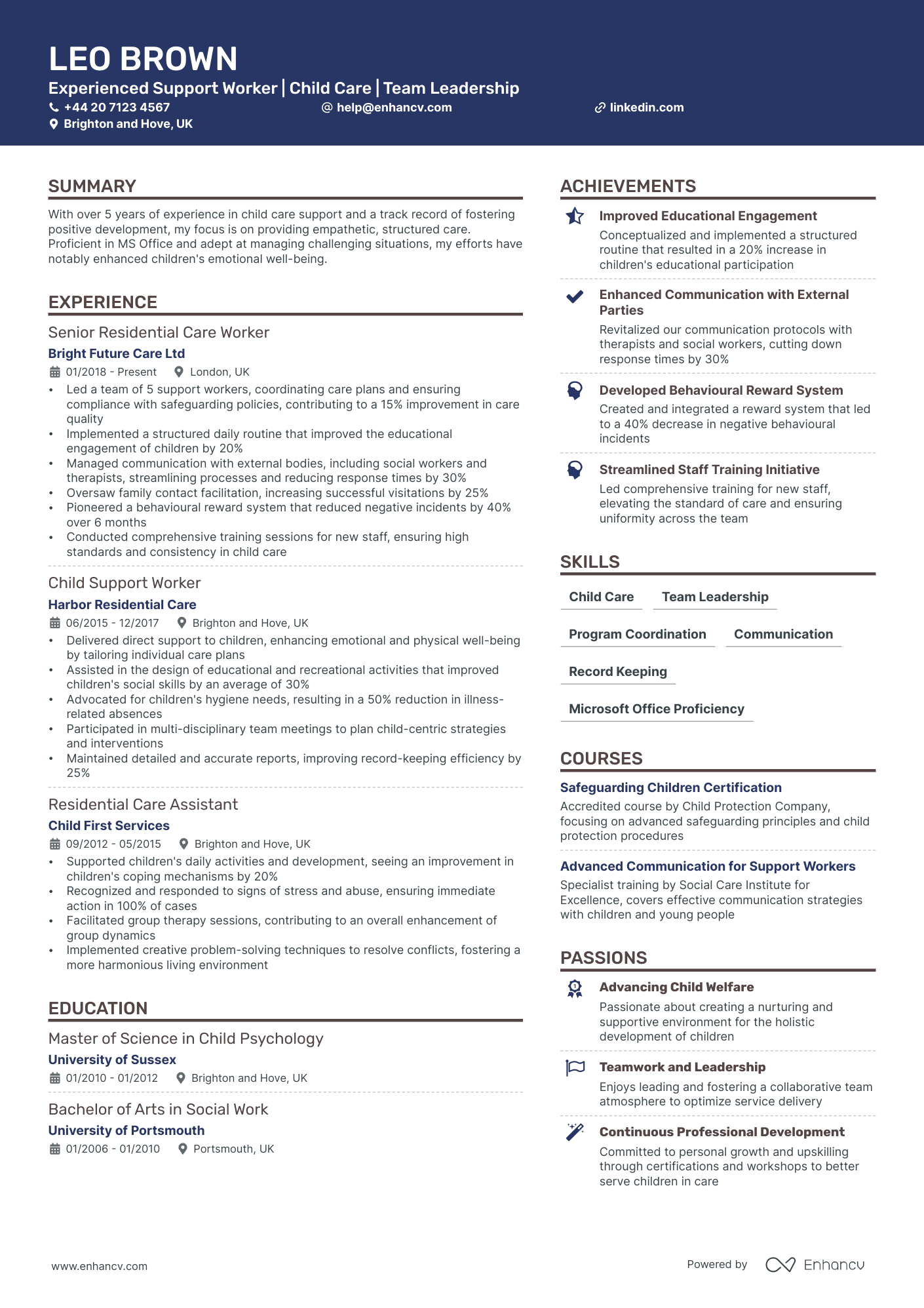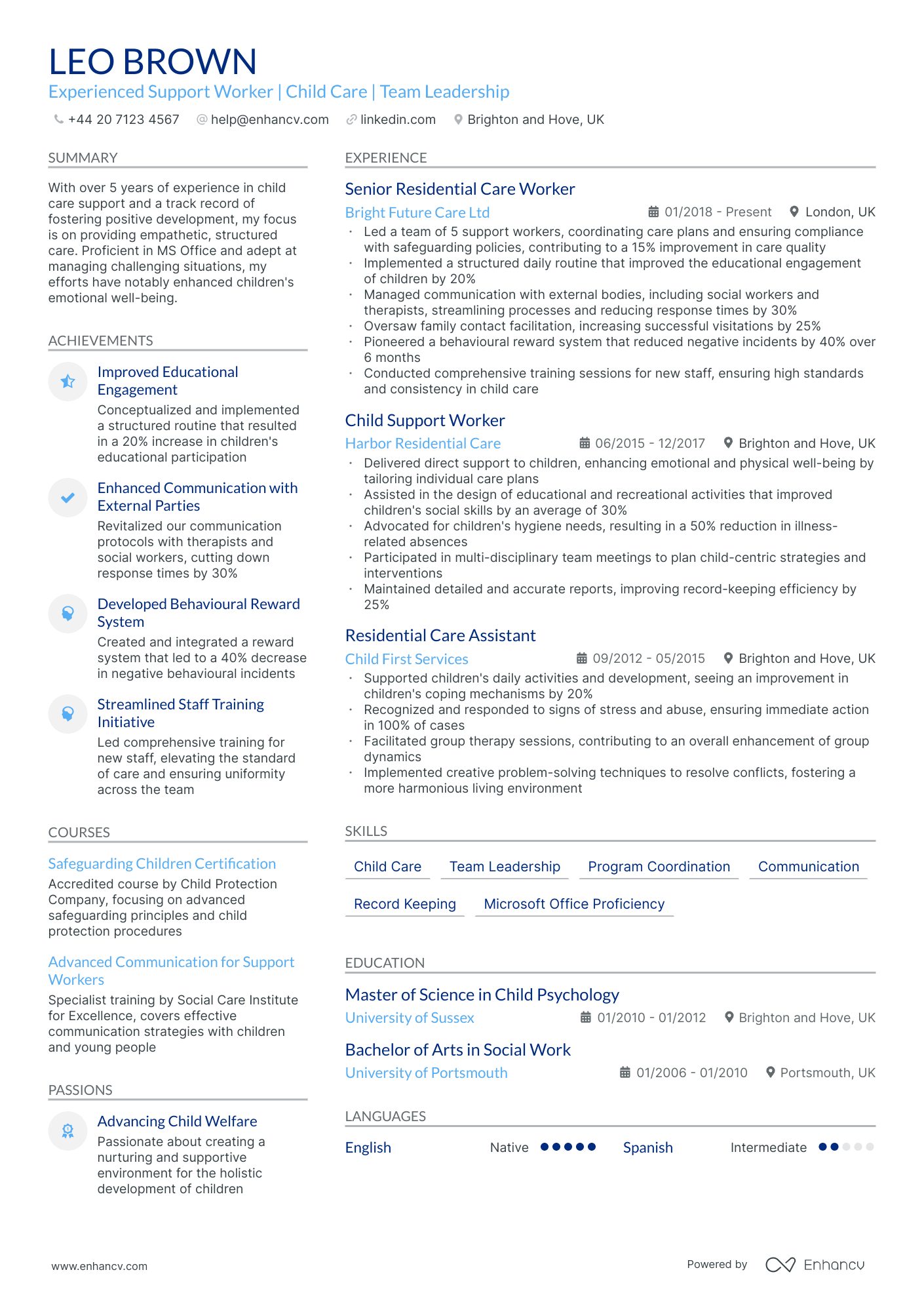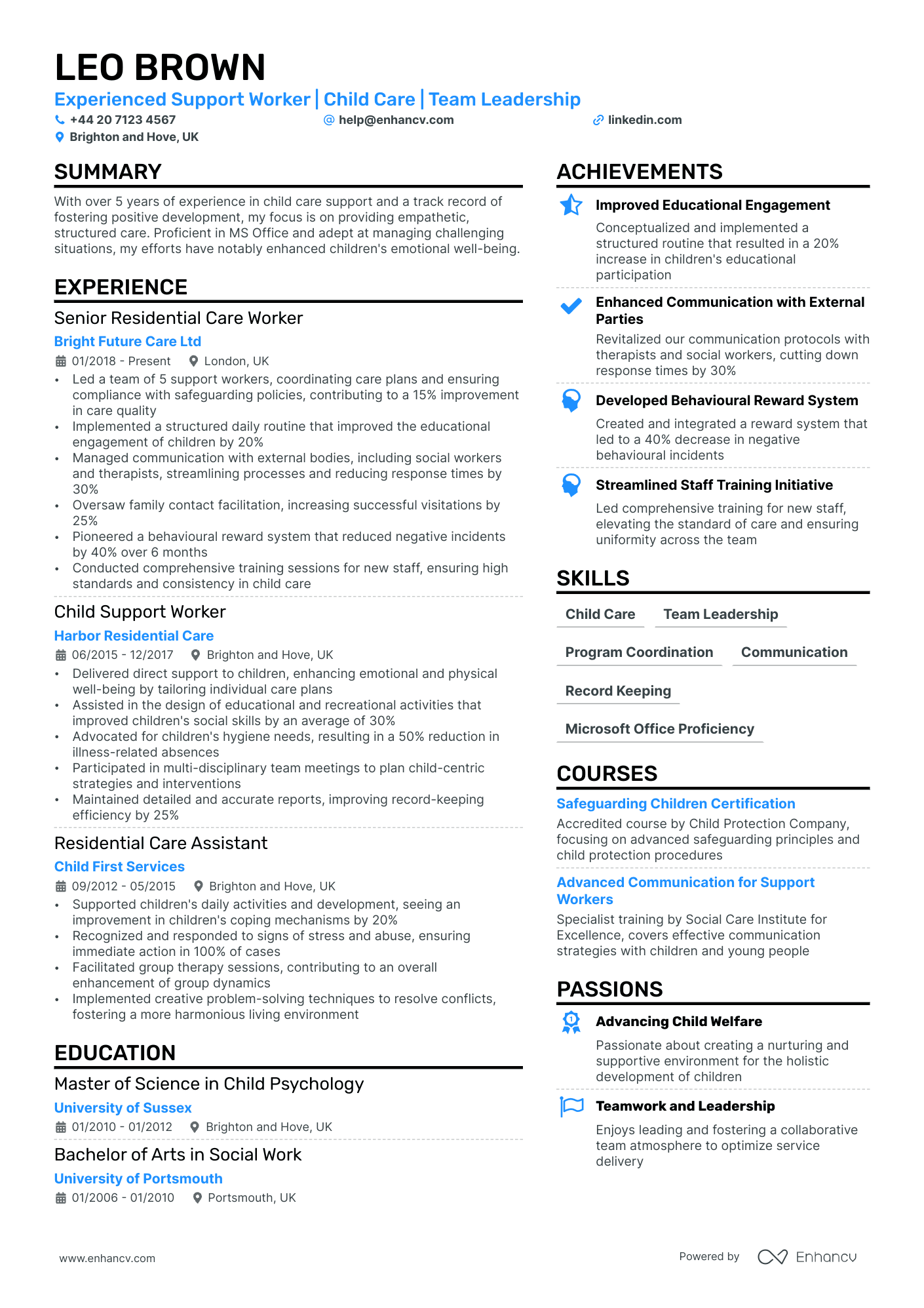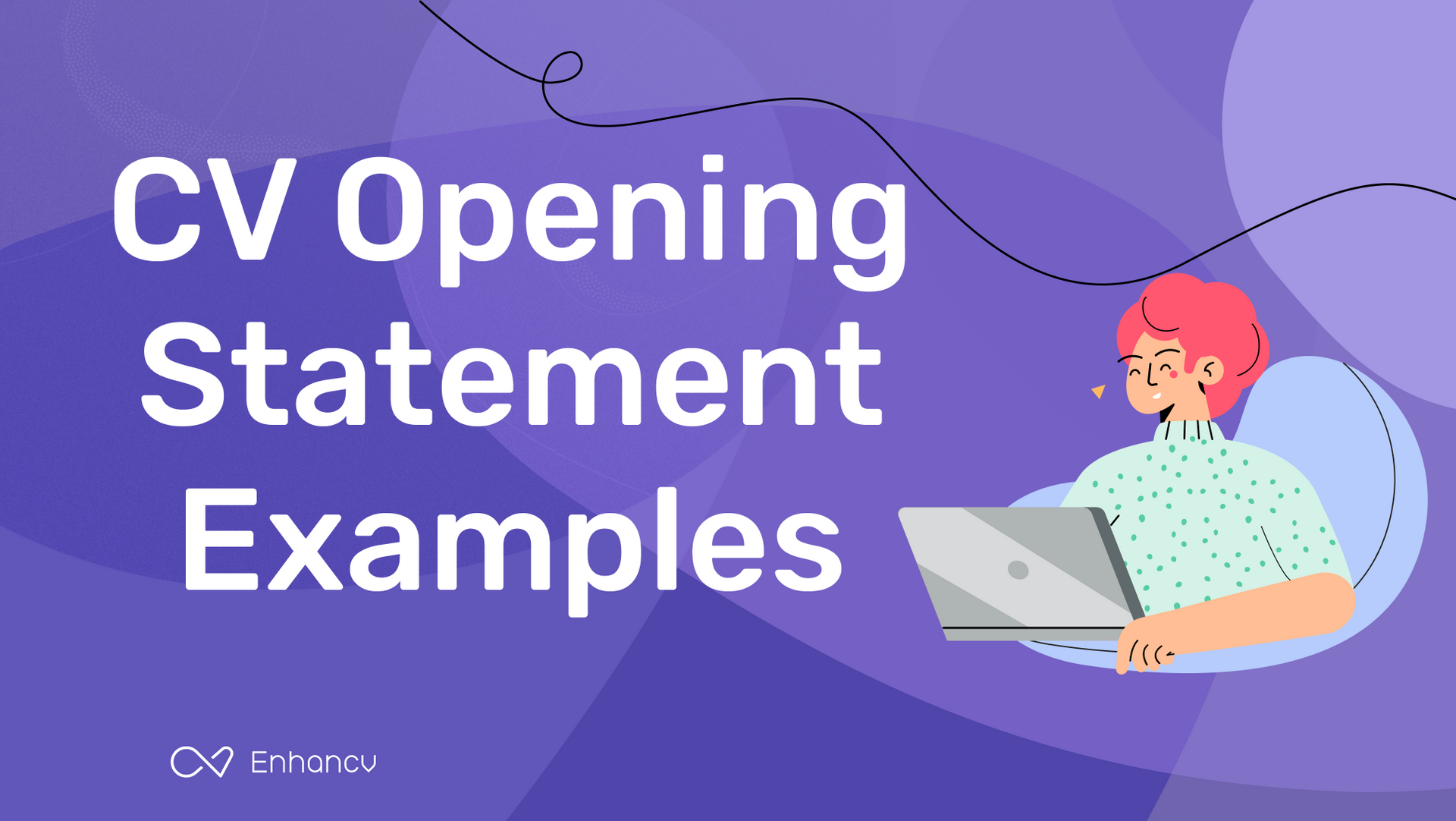Crafting a CV as a support worker often involves the challenge of effectively showcasing the breadth of your interpersonal skills and varied experiences. Our comprehensive guide provides expert tips and practical examples to help you articulate these skills compellingly, increasing your chances of landing your desired role.
- Create an attention-grabbing header that integrates keywords and includes all vital information;
- Add strong action verbs and skills in your experience section, and get inspired by real-world professionals;
- List your education and relevant certification to fill in the gaps in your career history;
- Integrate both hard and soft skills all through your CV.
Discover more industry-specific guides to help you apply for any role in the links below:
Structuring and formatting your support worker CV for an excellent first impression
The experts' best advice regarding your CV format is to keep it simple and concise. Recruiters assessing your CV are foremost looking out for candidates who match their ideal job profile. Your white space, borders, and margins. You may still be wondering which format you need to export your CV in. We recommend using the PDF one, as, upon being uploaded, it never alters your information or CV design. Before we move on to the actual content of your support worker CV, we'd like to remind you about the Applicant Tracker System (or the ATS). The ATS is a software that is sometimes used to initially assess your profile. Here's what you need to keep in mind about the ATS:- All serif and sans-serif fonts (e.g. Rubik, Volkhov, Exo 2 etc.) are ATS-friendly;
- Many candidates invest in Arial and Times New Roman, so avoid these fonts if you want your application to stand out;
- Both single and double column CVs can be read by the ATS, so it's entirely up to you to select your CV design.
PRO TIP
For certain fields, consider including infographics or visual elements to represent skills or achievements, but ensure they are simple, professional, and enhance rather than clutter the information.
The top sections on a support worker CV
- Personal statement offers insight into your commitment to care work, providing a quick summary of your skills and intentions.
- Employment history showcases direct experience and progression in support roles, demonstrating your practical abilities.
- Key achievements highlight specific contributions and successes, emphasising your impact in previous support roles.
- Relevant qualifications detail specific training and education, ensuring you meet the essential criteria for the role.
- Additional skills section presents supplementary abilities such as languages or IT skills, which can enhance your support work.
What recruiters value on your CV:
- Highlight experience in caregiving or support roles by detailing the specific duties you've handled and the types of clients or environments you've worked in, such as assisted living facilities, in-home support, or special needs education.
- Showcase your communication skills by mentioning any instances where you've successfully managed challenging conversations or situations, as clear and empathetic communication is vital for a support worker.
- Emphasise your qualifications and training, such as NVQs in Health and Social Care, safeguarding certificates, or first aid training, as these are often required for support worker roles.
- Demonstrate your commitment to personal development by including any additional courses or workshops you've attended that are relevant to care and support work, illustrating your dedication to providing high-quality service.
- Include any experience with care plans or record-keeping to exhibit your understanding of the administrative and regulatory aspects of support work and your ability to comply with them.
Recommended reads:
Our checklist for the must-have information in your support worker CV header
Right at the very top of your support worker CV is where you'd find the header section or the space for your contact details, headline, and professional photo. Wondering how to present your the name of the city you live in and the country abbreviation as your address;
- are tailored to the role you're applying for by integrating key job skills and requirements;
- showcase what your unique value is, most often in the form of your most noteworthy accomplishment;
- select your relevant qualifications, skills, or current role to pass the Applicant Tracker System (ATS) assessment. Still not sure how to write your CV headline? Our examples below showcase best practices on creating effective headlines:
Examples of good CV headlines for support worker:
- Community Support Worker | Mental Health Focus | NVQ Level 3 | 5+ Years' Experience
- Senior Home Care Assistant | Elderly & Dementia Care Specialist | NVQ Level 4 | 10 Years' Dedication
- Disability Support Coordinator | Inclusion Advocate | BTEC Health & Social Care | 7 Years in Role
- Family Support Advisor | Child Welfare Expert | Safeguarding Certificate | Committed 8-Year Service
- Youth Support Worker | Engagement & Rehabilitation | BA Youth Work | 4 Years Hands-on Experience
- Lead Residential Care Worker | Complex Needs | RQF Level 5 Diploma | 12 Years Progressive Experience
Catching recruiters' attention with your support worker CV summary or objective
Located closer to the top of your CV, both the summary and objective are no more than five sentences long and serve as an introduction to your experience. What is more, you could use either to entice recruiters to read on. Select the:
- Summary, if you happen to have plenty of relevant experience. Feature your most impressive accomplishments and up to three skills that are relevant to the job you're applying for;
- Objective, if you're just starting your career off. Provide your career goals and answer how you see the role you are applying for will match your professional growth.
Judging which one you need to add to your support worker CV may at times seem difficult. That’s why you need to check out how professionals, with similar to your experience, have written their summary or objective, in the examples below:
CV summaries for a support worker job:
- Seasoned Support Worker with over 7 years of dedicated experience in providing exceptional care to individuals with diverse needs. Skilled in implementing personalised support plans, administering medication, and coordinating with healthcare professionals. Proud of significantly improving the quality of life for a group of elderly residents through tailored activities and support.
- Compassionate professional with a decade of experience within the mental health sector, transitioning into a Support Worker role. Proficient in crisis intervention techniques and adept at developing trust-based relationships. Formerly led a successful community outreach program, awarded for its innovative approach to mental health awareness and support.
- Former educator seeking to leverage 8 years of experience in special needs education as a Support Worker. Highly skilled in creating effective individualised education plans, behavioural management and advocating for children's rights. Recognised for pioneering a district-wide initiative to integrate assistive technologies in classrooms for children with disabilities.
- With 5 years of expertise in high-pressure nursing environments, applying transferable skills to the support worker field. Accustomed to fast-paced settings and complex care requirements. Instrumental in developing a patient-centred care protocol that reduced hospital readmission rates by 15% within one year.
- Eager to apply compassionate nature and volunteer experience towards a career as a Support Worker. A recent psychology graduate with a comprehensive understanding of human behaviour, developmental challenges, and therapeutic interventions. Aim to contribute to the wellbeing of individuals needing support, drawing upon an academic background and a heartfelt desire to make a positive impact.
- Aspiring Support Worker with a strong foundation in health and social care principles, acquired through voluntary caregiving roles and a recent BSc in Health and Social Care. Determined to apply knowledge and commitment to improve the lives of those with additional support needs, fostering independence and community integration.
Narrating the details of your support worker CV experience section
Perhaps you've heard it time and time again, but, how you present your experience is what matters the most. Your CV experience section - that details your work history alongside your accomplishments - is the space to spotlight your unqiue expertise and talents. So, avoid solely listing your responsibilities, but instead:
- adverts' keywords and integrate those in your experience section;
- Use your CV to detail how you've been promoted in the past by including experience in the reverse chronological order.
Before you start writing your support worker CV experience section, dive into some industry-leading examples on how to structure your bullets.
Best practices for your CV's work experience section
- Detail your capacity for empathy and compassion, highlighting situations where you have provided emotional support to clients in their times of need.
- Specify instances of developing personalised care plans, focusing on how you assess individual needs to deliver tailored support.
- Include examples of how you have worked collaboratively with healthcare professionals, such as coordinating with nurses or therapists, to ensure holistic care.
- Emphasise your adeptness at daily living assistance, mentioning specific tasks such as helping with personal hygiene, meal preparation, or medication management.
- Showcase your communication skills by illustrating how you advocate for your clients' needs with families and other stakeholders.
- Demonstrate your ability to maintain client dignity and independence, giving examples of encouraging self-care and decision-making where appropriate.
- Reference any experience you have with specific populations like individuals with disabilities, the elderly, or children to show your specialisation.
- Highlight your capacity for crisis management, recounting times when you've effectively de-escalated situations or handled emergencies.
- Illustrate your commitment to continuous professional development by listing any relevant training or qualifications you've obtained that enhance your support capabilities.
- Provided comprehensive support to individuals with mental health challenges, ensuring daily living needs were met for 20+ clients.
- Developed and executed personalized care plans that increased clients' independence by 40% over a 1-year period.
- Organized and led weekly group activities that enhanced social skills and community involvement for clients.
- Delivered exceptional one-on-one care for elderly residents, facilitating a 95% satisfaction rate among clients and families.
- Coordinated with multidisciplinary teams, improving individual care strategies which resulted in a 30% decrease in medication errors.
- Managed emergency protocols during critical incidents, effectively reducing response times by 25%.
- Supervise a team of 10 junior support workers, providing training and mentorship to enhance service quality.
- Implement technology-driven care recording systems which increased reporting accuracy by 50%.
- Negotiate with service providers to integrate additional support services, expanding client care options.
- Assisted individuals with disabilities in vocational training programs, resulting in 15 clients securing employment.
- Carried out mobility training for clients with physical limitations, increasing their access to community resources by 35%.
- Orchestrated successful fundraising events that raised over $200,000 for facility enhancements and programs.
- Facilitated daily educational workshops for children with autism, boosting communication skills across the group by 50%.
- Regularly assessed individual progress and updated care plans, resulting in a more tailored approach for each child.
- Organized community inclusion events that connected 30+ children with peer support groups.
- Administered direct health care provisions to 15-20 elderly clients per week, with documented improvement in wellness metrics.
- Acted as an advocate for clients' rights, ensuring their needs and preferences were prioritized in care decisions.
- Improved the daily operations of client care through the introduction of efficient scheduling systems.
- Spearheaded the integration of assistive technologies for clients with mobility challenges, improving their autonomy by 60%.
- Engaged in continuous professional development, mastering new therapeutic techniques to better support the well-being of clients.
- Managed sensitive family dynamics and provided counseling support, enhancing client-centered care.
- Provided palliative care support for terminally ill patients, maintaining a compassionate environment that honored patient dignity.
- Formulated effective behavioral management strategies that reduced episodes of aggression in clients by 70%.
- Collaborated with healthcare professionals to streamline care transitions, minimizing patient stress during hospital visits.
- Mediated conflicts within residential settings, creating harmonious living conditions for all residents.
- Guided clients through bureaucratic processes to access governmental support services, increasing successful claims by 80%.
- Designed and monitored behavior modification plans that reduced challenging behaviors in 90% of clients within 6 months.
- Conducted home visits to assess clients for home adaptation needs, facilitating safer home environments for 50+ clients.
- Created a peer mentorship program for clients with intellectual disabilities, fostering a supportive community network.
- Analyzed and compiled client progress reports, presenting findings to stakeholders to secure ongoing funding for support programs.
What to add in your support worker CV experience section with no professional experience
If you don't have the standard nine-to-five professional experience, yet are still keen on applying for the job, here's what you can do:
- List any internships, part-time roles, volunteer experience, or basically any work you've done that meets the job requirements and is in the same industry;
- Showcase any project you've done in your free time (even if you completed them with family and friends) that will hint at your experience and skill set;
- Replace the standard, CV experience section with a strengths or achievements one. This will help you spotlight your transferrable skills that apply to the role.
Recommended reads:
PRO TIP
Describe how each job helped you grow or learn something new, showing a continuous development path in your career.
The CV skills' divide: between hard and soft skills
Of course, you may have read the job requirements plenty of times now, but it's key to note that there is a difference between technical and personal skills. Both are equally relevant to your job application. When writing about your skill set, ensure you've copy-pasted the precise skill from the job requirement. This would not only help you ensure you have the correct spelling, but also pass any Applicant Tracker System (ATS) assessments.
- Hard skills show your technological capabilities. Or whether you'll be a good technical fit to the organisation. Ensure you've spotlighted your hard skills in various sections of your CV (e.g. skills section, projects, experience) by including the technology and what you've attained;
- Soft skills pinpoint your personality and people or communication skills, hinting at if you'll easily accomodate into the team or organisation. Quantify your soft skills in your CV achievements, strengths, summary/objective, and experience sections. Always support your soft skills with how they've helped you grow as a professional.
Top skills for your support worker CV:
Patient care
CPR and first aid certified
Medication administration
Mental health support
Personal care assistance
Knowledge of disability support
Record keeping
Care planning
Health and safety compliance
Crisis intervention
Empathy
Communication
Problem-solving
Patience
Interpersonal skills
Teamwork
Time management
Adaptability
Stress management
Cultural sensitivity
PRO TIP
Focus on describing skills in the context of the outcomes they’ve helped you achieve, linking them directly to tangible results or successes in your career.
Your university degree and certificates: an integral part of your support worker CV
Let's take you back to your uni days and decide what information will be relevant for your support worker CV. Once more, when discussing your higher education, select only information that is pertinent to the job (e.g. degrees and projects in the same industry, etc.). Ultimately, you should:
- List only your higher education degrees, alongside start and graduation dates, and the university name;
- Include that you obtained a first degree for diplomas that are relevant to the role, and you believe will impress recruiters;
- Showcase relevant coursework, projects, or publications, if you happen to have less experience or will need to fill in gaps in your professional history.
PRO TIP
Focus on describing skills in the context of the outcomes they’ve helped you achieve, linking them directly to tangible results or successes in your career.
Recommended reads:
Key takeaways
Your successful job application depends on how you well you have aligned your support worker CV to the job description and portrayed your best skills and traits. Make sure to:
- Select your CV format, so that it ensures your experience is easy to read and understand;
- Include your professional contact details and a link to your portfolio, so that recruiters can easily get in touch with you and preview your work;
- Write a CV summary if you happen to have more relevant professional experience. Meanwhile, use the objective to showcase your career dreams and ambitions;
- In your CV experience section bullets, back up your individual skills and responsibilities with tangible achievements;
- Have a healthy balance between hard and soft skills to answer the job requirements and hint at your unique professional value.
